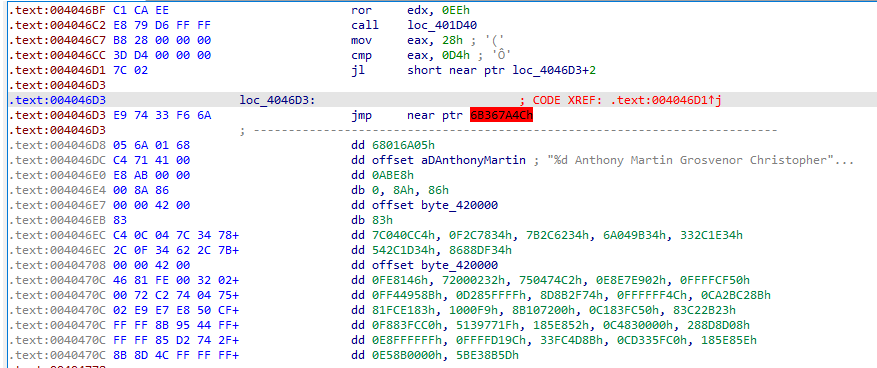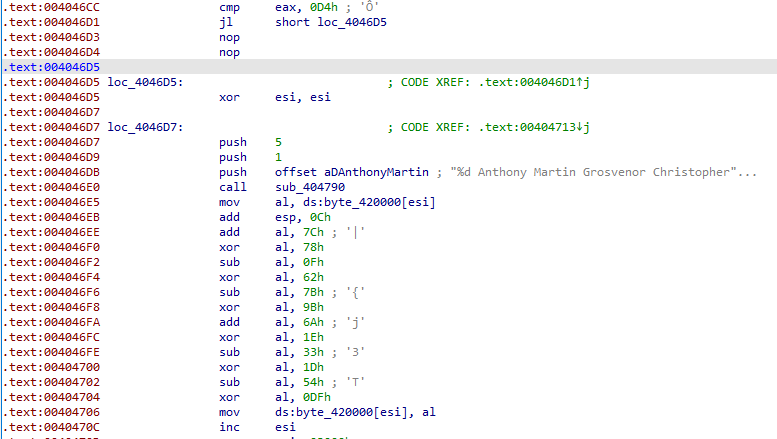Anti Analysis Techniques[TR]

Günümüzde, kötü niyetli yazılım geliştiricileri yazdıkları kötü amaçlı yazılımların incelenmesini zorlaştırmak için “Anti-analiz” olarak adlandırılan teknikleri kullanır. Bu teknikler, malware analistlerin sıkça kullandığı analiz araçlarını ve yöntemlerini etkisiz hale getirmeyi veya karmaşıklaştırmayı amaçlar. Bu araçlar ve yöntemler arasında disassembling, debugging ve virtual machine bulunabilir.
Bu yazıda size öğrendiğim teknikleri göstereceğim. Yazı, yeni teknikler öğrendikçe sürekli olarak güncellenecektir. Kodların tamamına ulaşmak için bu repo‘yu ziyaret edin.
Anti Disassembly Techniques
Anti-Disassembly tekniği, kodun analiz edilmesini zorlaştırmayı amaçlar ve genellikle kodun çalışma mantığını anlamaya çalışan tersine mühendislik uzmanlarına karşı kullanılır. Bu yöntem, runtime analizde önemini yitirse de, statik analizde işi zorlaştırabilir.
Impossible Disassembly

Resmi incelediğimizde loc_4046D3 adresinde anlamsız hex ifadeleri görüyoruz. IDA Pro kodu düzgünce okuyamıyor. Burada kodun gizlendiği anlaşılıyor. loc_4046D3 adresine sıçrayan jl short near ptr loc_4046D3+2 satırı dikkatimizi çekiyor. Bu kısımda, program çalışma anında loc_4046D3 adresinden başlayarak 2 bayt sonrasındaki adrese atlayarak çalışıyor. Ancak kullandığımız disassembler araçları, kodu ilk bayttan okumaya başladığı için düzgün şekilde çözümleyemiyor ve karmaşık bir sonuç ortaya çıkıyor.
Her ne kadar tekniğin ismi Impossible Disassembly olsa da çözümü oldukça basit. Program runtime da çalışırken loc_4046D3 adresinin ilk 2 byte’ını es geçtiği için ve disassembler aracı ilk byte’dan okumaya başladığı için yapmamız gerek ilk 2 byte’ı NOP kodu ile değiştirmek. Bu işlemi yapmak için hex editor gibi bir araç kullanabilirsiniz. E9 ve 74 adreslerini 90 ile değiştirdiğimizde disassembler aracımız kodu düzgünce yorumlayabiliyor.


32 bit programlarda bu tekniği otomatik olarak çözen script’e bu linkten ulaşabilirsiniz.
API Obfuscation
GetModuleHandleA ve GetProcAddress işlevleri ile API çağrılarını doğrudan çağırmak yerine program çalışırken dinamik olarak çağırabiliriz. Bu sayede kullanacağımız API çağrılarının statik analizde tespit edilmemesini sağlamış oluruz. Ayrıca bu yöntemi data obfuscation ile biraz daha karmaşık hale getirebiliriz.
#include <windows.h>
#include <iostream>
using namespace std;
void dynamicApiResolving(const char* str, const char* str2)
{
string decryptedString;
string decryptedString2;
for (int i = 0; i < strlen(str); i++) {
decryptedString += str[i] ^ 0x11;
}
for (int i = 0; i < strlen(str2); i++) {
decryptedString2 += str2[i] ^ 0x11;
}
const char* szMessage = "Hello World!";
const char* szCaption = "Hello!";
HMODULE hModule = GetModuleHandleA(decryptedString2.c_str());
if (!hModule)
cout << "error" << endl;
FARPROC fFuncProc = GetProcAddress(hModule, decryptedString.c_str());
((int (WINAPI*)(HWND, LPCSTR, LPCSTR, UINT)) fFuncProc)(0, szMessage, szCaption, 0);
FreeLibrary(hModule);
}
string xorFunc(const char* str) {
string encryptedString;
for (int i = 0; i < strlen(str); i++) {
encryptedString += str[i] ^ 0x11;
}
return encryptedString;
}
int main()
{
//cout << xorFunc("MessageBoxA") << endl;
ShowWindow(GetConsoleWindow(), 0);
if (FreeConsole()) {
dynamicApiResolving("\\tbbpvtS~iP", "dbtc\"#?u}}"); // api, dll
}
return 0;
}
Anti Debug Techniques
Anti debug tekniği ile bir programın debugger tarafından incelenmesini veya analiz edilmesini engellemek amaçlanır.
IsDebuggerPresent & CheckRemoteDebuggerPresent
IsDebuggerPresent ve CheckRemoteDebuggerPresent, bir programın bir debugger tarafından incelenip incelenmediğini belirlemek için kullanılır. CheckRemoteDebuggerPresent işlevi, belirli bir işlemin PID değerini alarak debugger tarafından incelenip incelenmediğini kontrol eder.
#include <iostream>
#include <windows.h>
using namespace std;
int main() {
if (IsDebuggerPresent()) {
ExitProcess(0);
}
BOOL isDebuggerPresent = false;
HANDLE hProcess = GetCurrentProcess();
CheckRemoteDebuggerPresent(hProcess, &isDebuggerPresent);
if (isDebuggerPresent) {
ExitProcess(0);
}
cout << "Everything's OK" << endl;
return 0;
}
BlockInput
BlockInput fonksiyonu, kullanıcının giriş aygıtlarını (klavye ve fare) geçici olarak devre dışı bırakma veya etkinleştirme yeteneğine sahiptir. Kod, bu fonksiyonu iki kez çağırarak hata ayıklama aracının bu fonksiyonu engelleyip engellemediğini kontrol etmeye çalışıyor. Normalde, bir hata ayıklama aracı bu tür işlemleri engelleyemez, bu nedenle eğer fonksiyon çağrıları başarılıysa, hata ayıklama aracı var gibi düşünülebilir.
#include <iostream>
#include <windows.h>
using namespace std;
bool IsHooked()
{
BOOL bFirstResult = FALSE, bSecondResult = FALSE;
__try
{
bFirstResult = BlockInput(TRUE);
bSecondResult = BlockInput(TRUE);
}
__finally
{
BlockInput(FALSE);
}
return bFirstResult && bSecondResult;
}
int main()
{
if (IsHooked()) {
cout << "Detect Debugger!" << endl;
}
}
FindWindow
FindWindow ile pencere sınıflarının varlığı kontrol edilerek debugger’ın varlığının tespit edilmesi amaçlanır.
#include <iostream>
#include <windows.h>
#include <vector>
using namespace std;
const vector<string> vWindowClasses = {
"antidbg",
"ID", // Immunity Debugger
"ntdll.dll",
"ObsidianGUI",
"OLLYDBG",
"Rock Debugger",
"SunAwtFrame",
"Qt5QWindowIcon",
"WinDbgFrameClass",
"Zeta Debugger",
"IDA",
"X32Dbg",
"x64dbg",
};
bool IsDebugged()
{
for (const string& sWndClass : vWindowClasses) {
const char* pszWndClass = sWndClass.c_str();
if (NULL != FindWindowA(pszWndClass, NULL)) {
return true;
}
}
return false;
}
int main() {
bool isDebuggerDetected = IsDebugged();
if (isDebuggerDetected) {
cout << "Debugger detected!\n";
}
return 0;
}
RaiseException
RaiseException ile eğer debugger tespit edilirse istisna fırlatılarak programın kapatılmasını sağlayabiliriz.
#include <Windows.h>
#include <iostream>
using namespace std;
bool Check()
{
__try
{
RaiseException(DBG_CONTROL_C, 0, 0, NULL);
return true;
}
__except (DBG_CONTROL_C == GetExceptionCode()
? EXCEPTION_EXECUTE_HANDLER
: EXCEPTION_CONTINUE_SEARCH)
{
return false;
}
}
int main() {
bool isDebuggerPresent = Check();
if (!isDebuggerPresent) {
printf("Debugger is not present.\n");
}
}
GetTickCount
GetTickCount kullanarak işlem başlangıcı ve bitişi arasındaki süreyi ölçebilir ve eğer belirtilen süreden büyükse programı sonlandırabiliriz. Pek kullanılan bir yöntem olmasada debugger ile program incelenirken aradaki süre artacağından dolayı bu yöntem kullanılabilir.
#include <iostream>
#include <windows.h>
using namespace std;
bool IsDebuggedd(DWORD dwNativeElapsed) // milisaniye
{
DWORD dwStart = GetTickCount();
// ...
return (GetTickCount() - dwStart) > dwNativeElapsed;
}
int main()
{
if (IsDebuggedd(1000)) {
cout << "Debugger Detected!" << endl;
}
}
QueryPerformanceCounter
QueryPerformanceCounter işlevi GetTickCount ile aynı amacı taşıyan bir diğer fonksiyonumuz.
#include <iostream>
#include <windows.h>
using namespace std;
bool IsDebugged(DWORD64 qwNativeElapsed) // milisaniye
{
LARGE_INTEGER liStart, liEnd;
QueryPerformanceCounter(&liStart);
// ...
QueryPerformanceCounter(&liEnd);
return (liEnd.QuadPart - liStart.QuadPart) > qwNativeElapsed;
}
int main()
{
if (IsDebugged(1000)) {
cout << "Debugger detected!" << endl;
}
}
Data Obfuscation
Data Obfuscation ile kötü amaçlı yazılımlara ait kodun gizlenerek analiz edilmesinin zorlaştırılması amaçlanır. Bu işlem için xor, base64, AES Encrypt/Decrypt gibi çeşitli yöntemler kullanılabilir.
Base64
openssl kütüphanesini kullanarak base64 encode/decode işlemlerini yapabiliriz.
#include <openssl/bio.h>
#include <openssl/buffer.h>
#include <openssl/evp.h>
#include <iostream>
std::string base64_encode(const std::string& input) {
BIO* bio, * b64;
BUF_MEM* bufferPtr;
b64 = BIO_new(BIO_f_base64());
bio = BIO_new(BIO_s_mem());
bio = BIO_push(b64, bio);
BIO_set_flags(bio, BIO_FLAGS_BASE64_NO_NL);
BIO_write(bio, input.c_str(), input.length());
BIO_flush(bio);
BIO_get_mem_ptr(bio, &bufferPtr);
BIO_set_close(bio, BIO_NOCLOSE);
BIO_free_all(bio);
return std::string(bufferPtr->data, bufferPtr->length);
}
std::string base64_decode(const std::string& input) {
BIO* bio, * b64;
char* buffer = new char[input.size()];
std::copy(input.begin(), input.end(), buffer);
bio = BIO_new_mem_buf(buffer, input.size());
b64 = BIO_new(BIO_f_base64());
bio = BIO_push(b64, bio);
BIO_set_flags(bio, BIO_FLAGS_BASE64_NO_NL);
int length = BIO_read(bio, buffer, input.size());
BIO_free_all(bio);
return std::string(buffer, length);
}
int main() {
std::string originalText = "To the King!";
std::string encodedText = base64_encode(originalText);
std::string decodedText = base64_decode(encodedText);
std::cout << "Original: " << originalText << std::endl;
std::cout << "Encoded : " << encodedText << std::endl;
std::cout << "Decoded : " << decodedText << std::endl;
return 0;
}
Xor
Olmazsa olmaz xor :)
#include <iostream>
#include <string>
using namespace std;
string xorEncrypt(string key, string message) {
string ciphertext = "";
for (int i = 0; i < message.length(); i++)
{
ciphertext += message[i] ^ key[i % key.length()];
}
return ciphertext;
}
string xorDecrypt(string key, string message) {
string res = "";
for (int i = 0; i < message.length(); i++)
{
res += message[i] ^ key[i % key.length()];
}
return res;
}
int main()
{
string key = "rivrivriv";
string message = "Ah nerede Vah nerede!";
string ciphertext = xorEncrypt(key, message);
cout << ciphertext << endl;
string res = xorDecrypt(key, ciphertext);
cout << res << endl;
return 0;
}
AES Encrypt/Decrypt
Daha güçlü şifreleme yöntemleri için AES Encrypt/Decrypt kullanılabilir. Bu örnek biraz karmaşık gelebilir fakat encrypt ve decrypt fonksiyonlarının kullanılacağını unutmayın.
#include <iostream>
#include <sstream>
#include <string>
#include <vector>
#include <memory>
#include <stdexcept>
#include <cstring>
#include <windows.h>
#include <openssl/aes.h>
#include <openssl/err.h>
#include <openssl/evp.h>
#include <openssl/aes.h>
#include <openssl/crypto.h>
using namespace std;
#define DECL_OPENSSL_PTR(tname, free_func) \
struct openssl_##tname##_dtor { \
void operator()(tname* v) { \
free_func(v); \
} \
}; \
typedef std::unique_ptr<tname, openssl_##tname##_dtor> tname##_t
DECL_OPENSSL_PTR(EVP_CIPHER_CTX, ::EVP_CIPHER_CTX_free);
struct error : public std::exception {
private:
std::string m_msg;
public:
error(const std::string& message)
: m_msg(message) {
}
error(const char* msg)
: m_msg(msg, msg + strlen(msg)) {
}
virtual const char* what() const noexcept override {
return m_msg.c_str();
}
};
struct openssl_error : public virtual error {
private:
int m_code = -1;
std::string m_msg;
public:
openssl_error(int code, const std::string& message)
: error(message),
m_code(code) {
std::stringstream ss;
ss << "[" << m_code << "]: " << message;
m_msg = ss.str();
}
openssl_error(int code, const char* msg)
: error(msg),
m_code(code) {
std::stringstream ss;
ss << "[" << m_code << "]: " << msg;
m_msg = ss.str();
}
const char* what() const noexcept override {
return m_msg.c_str();
}
};
static void throw_if_error(int res = 1, const char* file = nullptr, uint64_t line = 0) {
unsigned long errc = ERR_get_error();
if (res <= 0 || errc != 0) {
if (errc == 0) {
return;
}
std::vector<std::string> errors;
while (errc != 0) {
std::vector<uint8_t> buf(256);
ERR_error_string(errc, (char*)buf.data());
errors.push_back(std::string(buf.begin(), buf.end()));
errc = ERR_get_error();
}
std::stringstream ss;
ss << "\n";
for (auto&& err : errors) {
if (file != nullptr) {
ss << file << ":" << (line - 1) << " ";
}
ss << err << "\n";
}
const std::string err_all = ss.str();
throw openssl_error(errc, err_all);
}
}
class aes256_cbc {
private:
std::vector<uint8_t> m_iv;
public:
explicit aes256_cbc(std::vector<uint8_t> iv)
: m_iv(std::move(iv)) {
}
void encrypt(const std::vector<uint8_t>& key, const std::vector<uint8_t>& message, std::vector<uint8_t>& output) const {
output.resize(message.size() * AES_BLOCK_SIZE);
int inlen = message.size();
int outlen = 0;
size_t total_out = 0;
EVP_CIPHER_CTX_t ctx(EVP_CIPHER_CTX_new());
throw_if_error(1, __FILE__, __LINE__);
// todo: sha256 function
// const std::vector<uint8_t> enc_key = key.size() != 32 ? sha256(key) : key;
const std::vector<uint8_t> enc_key = key;
int res;
res = EVP_EncryptInit(ctx.get(), EVP_aes_256_cbc(), enc_key.data(), m_iv.data());
throw_if_error(res, __FILE__, __LINE__);
res = EVP_EncryptUpdate(ctx.get(), output.data(), &outlen, message.data(), inlen);
throw_if_error(res, __FILE__, __LINE__);
total_out += outlen;
res = EVP_EncryptFinal(ctx.get(), output.data() + total_out, &outlen);
throw_if_error(res, __FILE__, __LINE__);
total_out += outlen;
output.resize(total_out);
}
void decrypt(const std::vector<uint8_t>& key, const std::vector<uint8_t>& message, std::vector<uint8_t>& output) const {
output.resize(message.size() * 3);
int outlen = 0;
size_t total_out = 0;
EVP_CIPHER_CTX_t ctx(EVP_CIPHER_CTX_new());
throw_if_error();
// todo: sha256 function const std::vector<uint8_t> enc_key = key.size() != 32 ? sha256(key.to_string()) : key;
// means you have already 32 bytes keys
const std::vector<uint8_t> enc_key = key;
std::vector<uint8_t> target_message;
std::vector<uint8_t> iv;
iv = m_iv;
target_message = message;
int inlen = target_message.size();
int res;
res = EVP_DecryptInit(ctx.get(), EVP_aes_256_cbc(), enc_key.data(), iv.data());
throw_if_error(res, __FILE__, __LINE__);
res = EVP_DecryptUpdate(ctx.get(), output.data(), &outlen, target_message.data(), inlen);
throw_if_error(res, __FILE__, __LINE__);
total_out += outlen;
res = EVP_DecryptFinal(ctx.get(), output.data() + outlen, &outlen);
throw_if_error(res, __FILE__, __LINE__);
total_out += outlen;
output.resize(total_out);
}
};
static std::vector<uint8_t> str_to_bytes(const std::string& message) {
std::vector<uint8_t> out(message.size());
for (size_t n = 0; n < message.size(); n++) {
out[n] = message[n];
}
return out;
}
static std::string bytes_to_str(const std::vector<uint8_t>& bytes) {
return std::string(bytes.begin(), bytes.end());
}
int main(int, char**) {
const std::string iv = "1234567890123456";
const std::string message = "hello world";
// 32 bytes (256 bits key)
const std::string key = "passwordpasswordpasswordpassword";
const aes256_cbc encryptor(str_to_bytes(iv));
std::vector<uint8_t> enc_result;
encryptor.encrypt(str_to_bytes(key), str_to_bytes(message), enc_result);
std::cout << bytes_to_str(enc_result) << std::endl;
std::vector<uint8_t> dec_result;
encryptor.decrypt(str_to_bytes(key), enc_result, dec_result);
std::cout << bytes_to_str(dec_result) << std::endl;
// output: hello world
return 0;
}